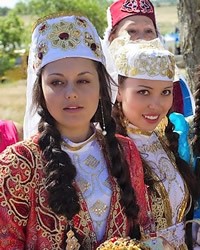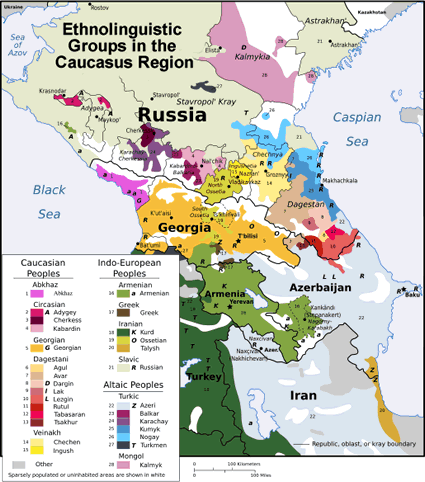Throughout history, Armenia has been a battlefield for many invaders and contending empires, and a bridge for many cultures and civilizations. During the past 2,700 years, Armenia has been conquered by the Persian Empire, Alexander the Great, the Roman Empire, the Byzantines, Arabs, Mongols, Tatars, Ottomans, Persians, and Russians. Armenian kingdoms, principalities, and even a short-lived empire (95-55 B.C.) managed to survive and thrive for some 1,700 years. Under various kings and princes, the Armenians developed a sophisticated culture, an original architecture, and their own alphabet.The 1905 Russian revolution and the 1908 Young Turk revolution raised the hopes of the Armenians for reform and an opportunity to build a homeland in historical Armenia. These hopes were dashed as the Ottoman and the Russian Empires fought each other during World War I. A dark hour of Armenian history is the Armenian genocide, which started on April 24, 1915. Some 1,750,000 Armenians were deported to Syria and Mesopotamia by the Ottoman authorities. Subject to famine, disease, and systematic massacres, most of them perished. This "ethnic cleansing" of the Armenians from their historical homeland led Raphael Lemkin, the father of the Genocide Treaty, to coin the new term "genocide" in the 1930s to describe the historical plight of the Assyrians and the Armenians as subjects of the first genocide of the 20th century. Armenia gained independence on September 23, 1991.Today, there are several million Armenians worldwide. Significant numbers are located in Armenia and the United States of America. Major diaspora centers of the Middle East are Iran, Syria, and Lebanon. There are also Armenian communities in some of the European and Latin American countries, such as Greece. Armenians first settled in Greece in the 5th-7th century.
Today, most of them are descendants of survivors of the Armenian Genocide, making Greece no longer a temporary refuge, but a home. The Armenian Greek community is represented by the diversity of Armenians involved in spiritual, cultural, social, and political life. Due to the number of Armenians in Greece, there are many daily schools for the children to attend to help apply Armenian history and traditions to the school's curriculum. The influence of Armenians in Greece is so prominent that in 2014, the parliament passed a law that criminalized the denial of the genocide, war crimes, and crimes against humanity.With over ten Armenian Apostolic, Catholic, and Evangelical Armenian Churches, the diaspora continues to show its love for the traditions of its faith. Families gather and fill the churches during Holy holidays such as Easter, Christmas, Lent, and memorial events to commemorate the Armenian Genocide. The Armenians in Greece are known for their prosperous work in the jewelry business and hospitality. The Armenian culture is known for its delicious foods and beautiful craftsmanship with gold and other metals.
In 301 AD, during the rule of King Dirtad III, Armenia became the world's first Christian nation. A Christian monk, commonly known as Krikor Lusavorich or St. Gregory the Illuminator, cured the King from a disease. After this event, King Dirtad III was baptized and accepted Christianity as Armenia's official state religion. Before this, two disciples had brought Christianity to Armenia, St. Thaddeus and St. Bartholemew.Spiritually, Armenians are still Christian, but their faith in Christ has often taken the back seat to nationalism or a faith in their heritage. Every generation needs a fresh work of the Holy Spirit to move them to full devotion to Jesus Christ.
Armenians need the Holy Spirit to move in their families and their churches so they can enjoy the abundant life that only Jesus offers.
Pray for the Armenians in Greece to be salt and light to those who don't know the only Savior.Pray for spiritual peace; this is what Armenia needs most of all.Pray that God would bring revelation of Christianity as a spiritual relationship, and that Armenians would realize they can have joy and peace as they follow the Lord.Pray for their businesses to flourish as a testimony of God's power and goodness.Pray for the Armenian Evangelicals in Greece to continue sharing their faith to those who are deceived by traditions and works.Pray that God will open the eyes of the Armenians to place the same love in their faith as they do in their rich culture.Pray for God to draw them to worship and praise every day and not only on holy holidays or memorial days.
Scripture Prayers for the Armenian in Greece.
Middle East Resourceshttps://en.wikipedia.org/wiki/Armenians_in_Greecehttps://armenianprelacy.gr/en/the-armenian-orthodox-community-of-greece/https://asbarez.com/armenians-in-greece-past-and-present/https://www.noravank.am/eng/articles/detail.php?ELEMENT_ID=6526http://diaspora.gov.am/en/pages/64/greecehttps://agbu.org/statehood-challenged/greece-always-safe-haven-armenianshttps://www.armenia.com.au/news/Feature-Articles/English/63435/Armenians-in-Greece--Past-and-Present#:~:text=The%20millennials%20in%20their%2030s,strong%20since%20the%20Byzantine%20era.
| Profile Source: Joshua Project |













